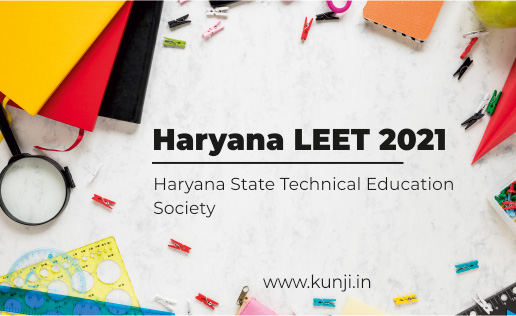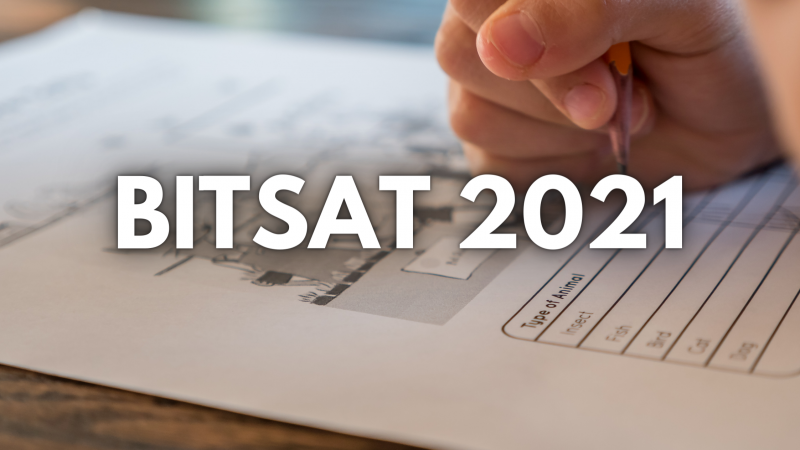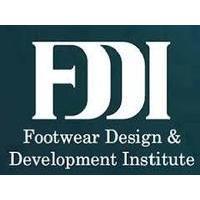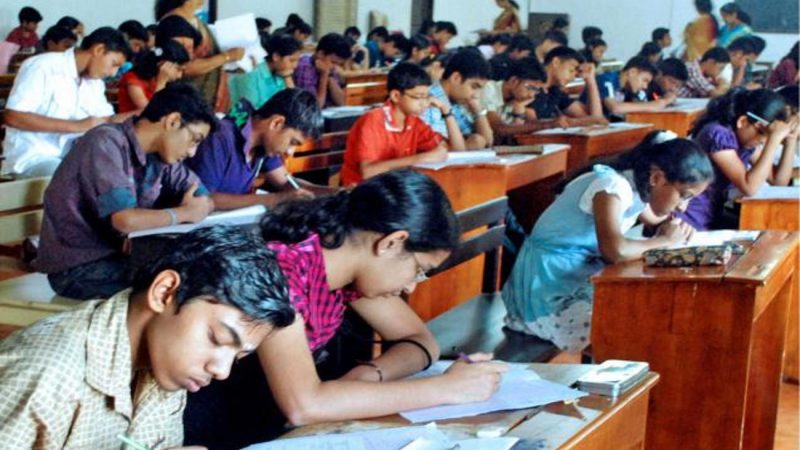Haryana LEET 2021 Application will be released in the second week of April 2021. Haryana LEET stands for the Haryana Lateral Entry Entrance exam & this entrance exam especially for the students who are interested in the B.Tech /B.E courses for the crosswise entry system. This entrance test is organized for the students by the HSTES (Haryana State Technical Education Society).
Exam Dates for Haryana LEET 2021
Important dates given below:
| Important Events | Dates (Tentative) |
| Application form availability | 2nd week of April 2021 |
| Application last submission | Last week of May 2021 |
| Admit card | 1st week of June 2021 |
| Exam date | 3rd week of June 2021 |
| Results | 1st week of July 2021 |
| Counseling | July 2021 |
| Display of Inter-Se-Merit | July 2021 |
| Closing date for Display of Inter-Se-Merit | August 2021 |
Eligibility Criteria for Haryana LEET 2021
Some important details related to the eligibility criteria is as per below for the students :
- There is no maximum or minimum age limit for this entrance test.
- Students should be a citizen of India.
- Students must have cleared Part 1 of B.Sc./B.Tech or should have a Diploma in Engineering.
- The students should have scored a minimum of 45% of the score in total in the qualifying test.
- The students should have studied Chemistry Physics, & Mathematics in the qualifying test.
Application Form for Haryana LEET 2021
The students will be able to fill and submit their application form in online mode from the month of April 2021. To obtain the application form, the students will have to visit the official website www.onlinetesthry.gov.in.
- The application form, the Students will have to submit their personal details, contact details, qualification details, etc.
- The students will also have to upload their signature and photograph in the application form in a scanned format.
- The students can submit their duly-filled application form along with the required fee.
- A different application form number will be generated after the successful submission of the form.
- Any error in the form can be corrected until the last date of application submission.
- The students must not submit multiple applications under any circumstances.
- The students should keep a photocopy of the filled application form along with them in case of any further use.
- The students can submit the application fee through only a credit card/ net banking /debit card or e-Challan.
- The application fee will be Rs. 500/- for general category students and Rs. 200/– for reserved category students.
Exam Pattern for Haryana LEET 2021
The exam pattern for Haryana LEET 2021 entrance exam is given below:
- Mode of exam: Online
- Number of sections: 4 (A, B, C & D)
- Number of questions: 90
- Duration of exam: 1 hour 30 minutes
- Total marks: 90
- Marking scheme: Each question will carry 1 mark.
Syllabus for Haryana LEET 2021
Basic Sciences
Mathematics- Arithmetic, Geometric and Harmonic Progressions, Maxima and Minima, Partial Differentiation, Definite and Indefinite Integration. First-order and first-degree ordinary differential equations.Binomial expansion, Matrices, Elementary operations, Rank of a matrix, Parabola, Ellipse and Hyperbola, Differentiation of a function, implicit function, parametric function. Successive differentiation.
Physics-
Units and Dimensions with Dimensional analysis and their Limitations, Newton’s law of gravitation, Kepler’s law and Satellite, Heat and temperature, measurement of temperature and mode of transfer of heat and their laws, Geometric optics and simple optical instruments simple laws of electrostatics and their use to find the E and Potential, Capacitors and dielectric constant, Laser, its principle and use, superconductivity, Conventional and non-conventional energy sources, Motion in one and two dimensions and Newton’s Laws of Motion.Work and Energy and Conservation Laws of Energy, Properties of matter i.e. Elasticity, surface tension. and viscosity in a fluid motion. Waves and vibration, Characteristics of waves and simple Harmonic motion.Rotational motion, Conservation of angular momentum.Gravitation.
Chemistry–
Hard and soft water, types of hardness, disadvantages of the hardness of water, its causes and its remedies, Brief introduction of the term, Acidity, Basicity, Ionization, Equivalent weight, PH value, Definition of symbol, formula, valency & chemical equation.
Communication Skill-
Words, antonyms, and synonyms, Eligibility for admission to LEET, Number of Institutions offering BE/B.Tech. & B.Pharmacy, Name the Processes involved in on-line off-campus counseling, General awareness about Haryana, Name of Ministers/Chief Minister/Governor, No.of Districts/Tehsils/Blocks/villages, The total population of State/Area of state/Boundary states of Haryana, History of Haryana, communication technique Grammatical ability, Proposition, Correction, Voice, Narration, Punctuation, Tenses, correction incorrect sentences, General Awareness-General awareness about Technical Education in Haryana, Name of Polytechnic, Number of Polytechnics and sanctioned intake.
Electrical Engineering-
Electrical and Magnetic Circuits, EMF, Kirchhoff’s laws and Faraday’s Laws, Network theorems.constructions and operation of DC generator and motor. Induction Motor, Principle, construction and operation of three-phase induction motors. Transmission and Distribution, Advantage of high voltage for transmission, comparison of 3 phase, single phase, 2 phase, and three-wire D.C. Systems AC Circuits, RMS value, the behavior of RLC elements, series and parallel circuits, series and parallel resonance circuits. Transformers, Introductions to single-phase and three-phase transformers DC Machines, Theory.
Electronics Engineering- Measurements & Instrumentation, Errors, standards, accuracy precision resolution, Analog Electronics, Semiconductor diode circuits, Zener diode, and Zener diode circuits, LED, Photodiode, BJT, FET & their configurations and characteristics, Biasing, small-signal & large signal amplifiers, OP AMPS, oscillators, regulated power supply. Digital Electronics, Number System, conversion from one to another system, Binary arithmetic, codes conversion & parity; Logic gates; Boolean algebra, Flip Flop. Industrial Electronics and Control, SCR, DIAC, TRIAC, Ammeters, voltmeters, wattmeters, and energy meters, insulation tester, earth tester, multimeter, CRO, measurement of V, I & F on CRO low, medium & high resistance measurement, AC Bridges, Transducers for measurement of temperature, displacement, Communication System, Types of modulation, demodulation.
Computer Engineering-
Fundamentals of Computers, Organization of Digital Computers, Data Processing, High-Level Languages, Translators, Compilers, Interpreters, algorithms, Flow Charting, Instructions, assembly language Programming. Computer Organization, Overview of registers, bus organized computers, Programming in C, Steps in Program development, flowcharting, algorithm, C Language: Data types, Console I/O program control statements, arrays, structures, unions functions, pointers, enumerated data types and type statement, File handling, C standard library and header files. Basic of Computer networking, LAN, WAN, Internet & Application, instruction set, Instruction execution, Hard-wired and microprogrammed control units, Processor, Organization. Memory Organization: Cache and virtual memory, I/O organization. Operating Systems, Overview of Operating Systems, Basic functions, the concept of process, scheduling, memory management, critical section, synchronization, monitors.
Mechanical Streams:
Mechanical Engineering- Applied Mechanics, Friction, laws of friction, friction applications, the centroid of a plane area, Principal stresses, principal planes, B.M. & S.F. diagram for simply supported and cantilevers, beams, columns & struts. Thermodynamics, First law of thermodynamics, the second law of thermodynamics, zeroth law, steam properties, Diesel cycle, Otto cycle. Modes of Heat Transfer (Conduction, Convection, Radiation). Fluid Mechanics, Properties of fluid, Viscosity, Newtonian and Non-Newtonian fluids, Bernoulli’s Theorem, Types of Fluid flows, Dimensionless numbers, Measurement of fluid flow by the pilot tube, Venturimeter, Darcy equation.simple machines, screw jack, wheel & axles, the system of pulleys, projectile, work, power, energy. The strength of materials, Stress, Strain, Hooke’s law, stress-strain diagram, temperature stresses, composite section, Relation between elastic constants, (E.C.G.) Resilience.
Production Engineering/Manufacturing Processes-
Workshop Technology, Lathe- operations, turning machining Time, cutting speed, feed, depth of cut, Drilling, Type of drilling machines, Drilling operation, Drilling time, Milling, up milling, down milling, milling operations, milling cutters, milling time, Shaper & Planer Working Principle, Measuring Instruments and Gauges, Vernier Caliper, Micrometer, Sine Bar, Plug gauges, snap gauges, ring gauges welding, Soldering, Brazing. Foundry, Pattern and their types, molds and molding materials. Plastic & their properties, various molding processes of plastic. Industrial management, types of organizational structure, qualities & responsibilities of a good leader, methods of quality control, productivity, Material Science, Engg. Materials, Mechanical properties of materials, hardness testing methods, heat treatment, hardening annealing, tempering, carburizing, Normalizing. Engineering Graphics & Drawing, First angle, and third angle projection methods, orthographic views, Isometric views, conventions for lines and materials, Projections of lines and solids (only conceptual questions).
Automobile Engineering-
Power flow in an automobile, Gearbox & its types, use and types of breaks, types of clutches, basic knowledge of differential, cooling, lubrication of Engine, types of wheels and tires used in Automobile, major automobile industries.
Other Engineering Streams:
Civil Engineering-
Introduction to brick, raw materials for bricks, manufacturing of bricks, brickwork in the foundation.Index properties of soil, seepage of soil.Water demand for industrial/Commercial & domestic purposes, per capita demand, various sources of water, Treatment & Disposal of sludge, Types of foundation (Design not included), Repair & Maintenance of Buildings, Basic principles of surveying chain surveying, Bench-Mark, compass surveying, Basics of RCC (elementary knowledge) different grades of concrete, workability, mixing of concrete, compaction of concrete, Classification & suitability of various types of doors, roofs, Name of earthmoving machinery, different types of road material, flexible & rigid pavements, classification of bridges, the Water requirement of crops, methods of irrigations Concept/meaning/need/competencies/qualities of Entrepreneur classifications of dams & site selection for reservoir classifications of rocks various types of cement & their uses, The basis of Ecology, Pollution of water its causes & remedial near, Role of non-conventional sources of energy.
- Textile Engineering- Different types of fibers, Dyeing & Printing, Fabrics & yarn manufacturing & performance, Weaving Technology Textile testing & quality control Modern methods in yarn products Bleaching.
- Chemical/Printing Engineering– Elementary knowledge of Fluid Flow, Petrochemicals Introduction of printing machines/presses, types of printing, Chemical process industry, Agro-based industries.
- Ceramic Engineering- Classification of various pottery productions, ceramic material & their properties.
- Food Technology- Vitamins, cereals & Pulses milk & milk powder preservation of food process.
- Agriculture Engineering- Introduction to Farm equipment.
- Architecture- History of Indian Architecture, building topologies.
- Fashion Design & Fashion Technology- Knowledge of Fashion Technology, History & Culture, Introduction to garment manufacturing machines & tools.
Admit Card for Haryana LEET 2021
Students will be able to download the admit card of LEET 2021 from the official website tentatively in the 2nd week of May. Students will have to carry two copies of the admit card with photographs attested by a gazetted officer along with one valid Identity proof having her/his photograph on it to the allotted test center. The admit card will contain every necessary detail such as a student’s personal information, time, date, and exam center, & important guidelines.
Result for Haryana LEET 2021
The result uploaded month is June 2021. On that month students can visit the site and also check the result through the online mode only. The result will be issued for those students who are successfully appearing in the examination. They need the details for access to the Result. The students need the roll number & date of birth to access the result. The university also publishes the merit list and scorecard. The merit list is published on the basis of obtained marks. the university also declares the cutoff list. The cut off list has different parameters to define it. The cutoff list depends on how many students are appeared in the test, difficulties level of the test, last year cut off list &, etc.
Counseling for Haryana LEET 2021
Authority will send the call letter for the counseling process to the qualified students. The counseling process includes seat allotment process and they also verify all documents on that day. The first round of the counseling will be announced in July month 2021. The main motive of the counseling is to verify the all document the forward the eligible students for the admission. If the students not showing the original documents than the university not accept the students’ admission. The counseling center takes some charges and these charges paid by the student’s side by the demand draft. For the Haryana LEET 2021 counseling process, there is no other option to pay the fee.





